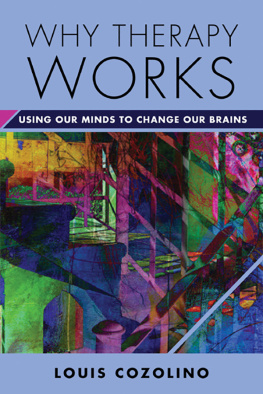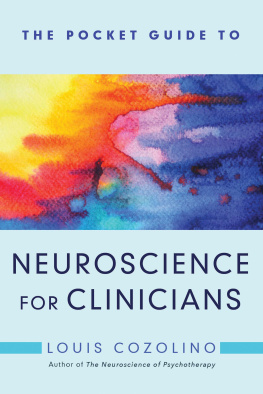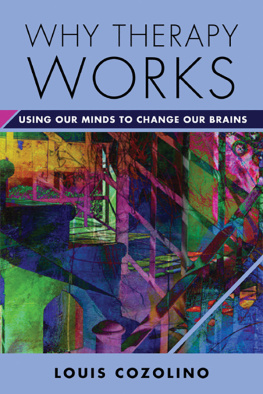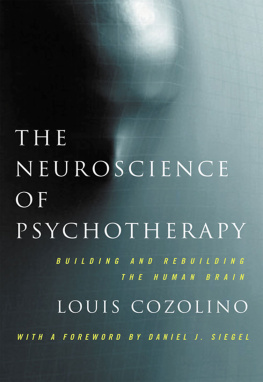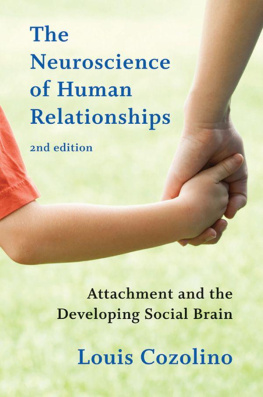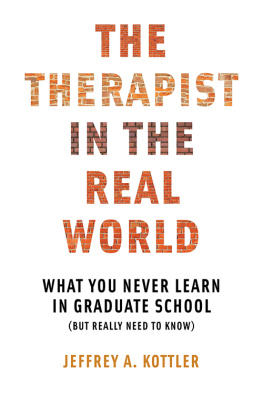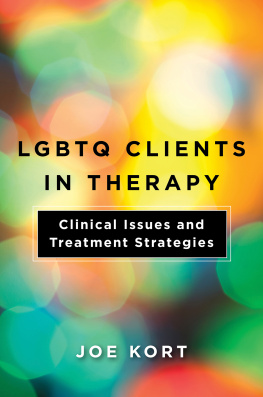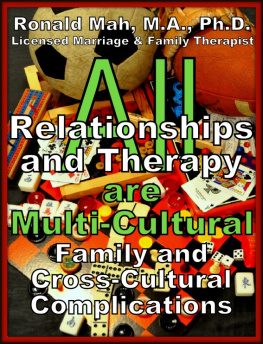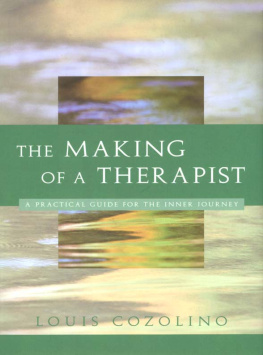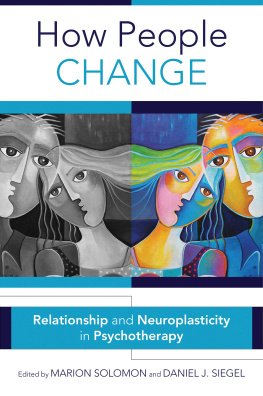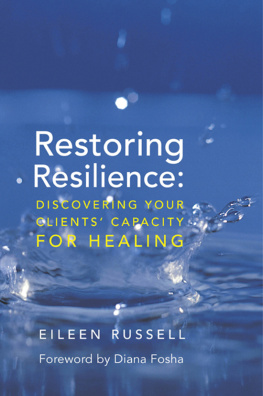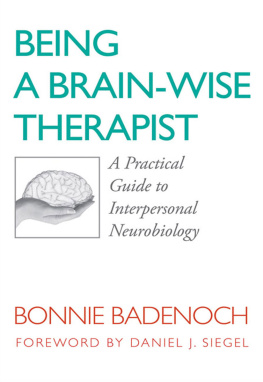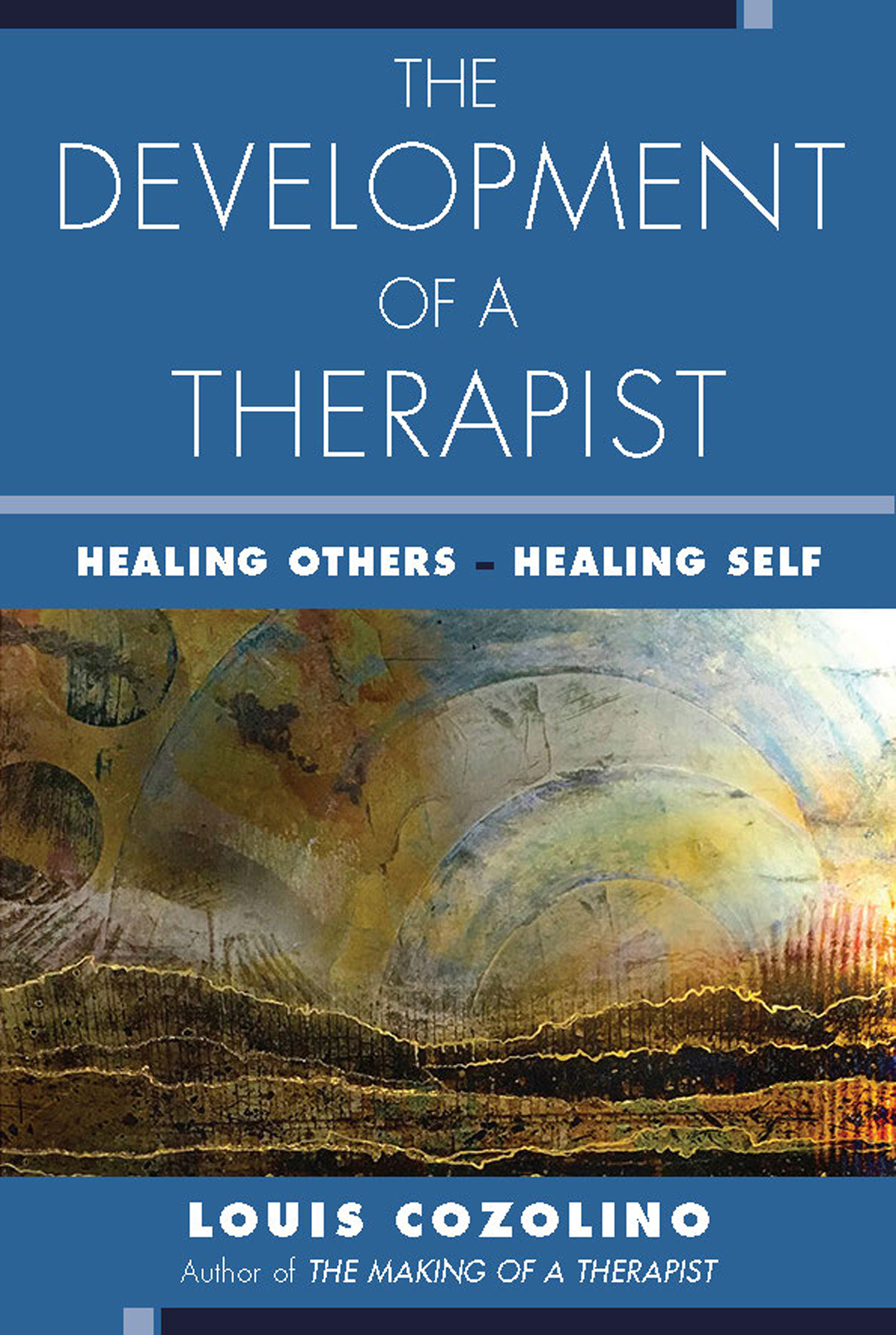Contents
Guide
Page List
THE NORTON SERIES ON INTERPERSONAL NEUROBIOLOGY
Louis Cozolino, PhD, Series Editor
Allan N. Schore, PhD, Series Editor, 20072014
Daniel J. Siegel, MD, Founding Editor
The field of mental health is in a tremendously exciting period of growth and conceptual reorganization. Independent findings from a variety of scientific endeavors are converging in an interdisciplinary view of the mind and mental well-being. An interpersonal neurobiology of human development enables us to understand that the structure and function of the mind and brain are shaped by experiences, especially those involving emotional relationships.
The Norton Series on Interpersonal Neurobiology provides cutting-edge, multidisciplinary views that further our understanding of the complex neurobiology of the human mind. By drawing on a wide range of traditionally independent fields of researchsuch as neurobiology, genetics, memory, attachment, complex systems, anthropology, and evolutionary psychologythese texts offer mental health professionals a review and synthesis of scientific findings often inaccessible to clinicians. The books advance our understanding of human experience by finding the unity of knowledge, or consilience, that emerges with the translation of findings from numerous domains of study into a common language and conceptual framework. The series integrates the best of modern science with the healing art of psychotherapy.
THE
DEVELOPMENT
OF A
THERAPIST
HEALING OTHERS HEALING SELF
LOUIS COZOLINO

A NORTON PROFESSIONAL BOOK
This book is dedicated to my colleagues and friendsChloe Drulis, Mary Meader, and Carly Samuelsonwho contributed to this work through their warmth, support, excellent questions, and all around wisdom.
CONTENTS
Im not a teacher: only a fellow traveler of whom you asked the way. I pointed aheadahead of myself as well as you.
GEORGE BERNARD SHAW
After your initial sessions, the weeks and months begin to pass, and you discover that the hundreds of hours sitting with your clients have taught you valuable lessons. You transition from the uncertainty of those early sessions to feeling the early kernels of confidence. You find encouragement in the handful of clients who have shown improvement. Hopefully, you have yet to fall asleep during a session, call a client by the wrong name, or forget to show up for an appointment. Surprises decrease, while the number of times you can predict what will happen next slowly rises.
As you approach your one-year anniversary, you may notice that your weekly hours have increased, your referral base is growing, and youre beginning to see the first glimmers of an established practice. You feel more like you have good answers for your clients questions and less like youre winging it and just making things up. Your student loans come due, and you actually find a way to pay them each month. For some, this phase of practice represents the tapering off of the educational process. They take the bits of information gleaned from school, add them to unconscious biases, and call the result an eclectic orientation. From now on, education will consist primarily of mandatory continuing education workshops, podcasts, and pop-psychology books.
Many of us, on the other hand, cant shake the feeling that something is missing, that there is much more to learn. I questioned then (and still do) the very foundations of my knowledge and wonder if the theories and methods of psychotherapy might just be an elaborate illusion. By the time I had gotten a license and my own office, I found myself sitting alone at the end of the day fearing that I didnt know anything. Of course, I did, and you could attribute some of these feelings to insecurity or depression, but I could clearly see that the human condition, psychological problems, and mental illness were vastly more complex than I was prepared for. I wondered whether I had made a poor career choice. Maybe I should have opened a bar instead.
I told my therapist about my dilemma. She looked at me with knowing affection and told me to say more. She was a kindly older woman who saw clients in her home office. She had a beautiful view, which I couldnt imagine she earned seeing clients. I wondered where her money came from. She wore the therapist uniform of the day, many layers of well-matched colored clothes of contrasting textures, overly large jewelry, and comfortable shoes. I told her that, despite all of my education and training, I felt like a fraud and felt like I had no clue what I was doing. Being a Jungian, she interpreted this as the inevitable doubt of any heroic journey, and, of course, she was right. I felt like I was also right. My ignorance and need of continued study and exploration also seemed to be an objective reality; and reality does matter.
Flash forward about 30 years. I was giving a talk to a large group of therapists when one asked the question, What percentage of your clients do you feel you heal? Thats an interesting question, I said as I grabbed my chin and assumed the ponder position. Ballpark, I replied, perhaps 50%, those clients whom I feel I was able to give what they came to therapy for. Without missing a beat, this seasoned therapist said, You must be a pretty bad therapist. That may well be, I replied, but let me ask you the same question: What percentage of clients do you think you heal? She replied, 100%, with great confidence and a knowing nod to those around her. It had never occurred to me to think that I, or anyone, could have a perfect therapeutic success rate. Could she really be more effective than penicillin?
SMOKING YOUR OWN BANANA
I just want you to know that when we are talking
about war, we are talking about peace.
GEORGE W. BUSH
As I stood at the front of the lecture hall, many things crossed my mind. It didnt seem like the time nor the place to dive into a discussion about my therapeutic abilities. The thing that stuck out to me was how open I was to the idea that I might be a bad therapist. It had taken me a long time to build up the courage to do public presentations about my ideas because I was anxious about being criticized and feared I would be overwhelmed by shame. I would have expected myself to be defensive rather than to be able to consider the possibility that I didnt know what I was doing. If I am a good therapist, what are the criteria? Who decides the measures and standards of quality? Does having a full practice for decades on the strength of word-of-mouth recommendations mean you know what youre doing, or is it possible to fool all the people all the time?
My suspicion is that the person who made the statement was somehow able to immerse herself in a theoretical orientation and drink deep and long from its particular set of beliefs. I remembered my own fantasy, as a student, of being able to heal everyone, or at least to have a strikingly positive impact on their lives. It didnt take many weeks into my first clinical placement to discover that psychotherapy, like the rest of life, doesnt work that way. Perhaps this seemingly experienced therapist had yet to have this experience. Back in the 1960s, a rumor circulated among us hippies that if you dried and smoked banana peels, you could get the same high as smoking marijuana. Of course, this was not true, but it was funny that so many people tried it. The term smoking your own banana came to refer to people who create a false idea and then believe it. Perhaps this therapist was smoking her own banana, perhaps not.
Next page

